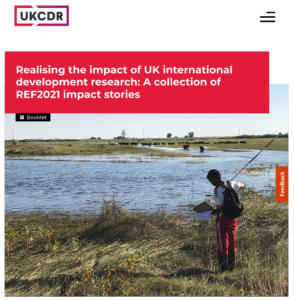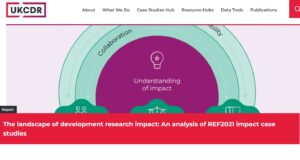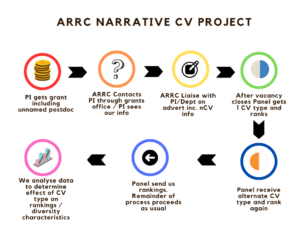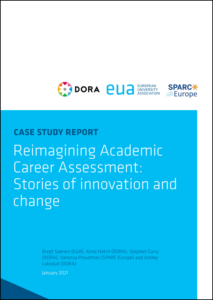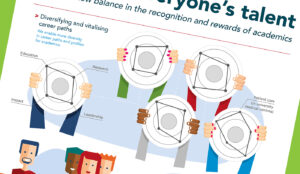A collection of materials to facilitate the development of responsible research and researcher assessment policies and practices.
Search and Filter
Resource type
Intended audience
Case studiesGood practicesInitiativesPolicies and guidance
DORA-produced
Aalborg University (AAU) in Denmark has embarked on an ambitious reform of its research assessment practices, aiming to move beyond traditional journal-based metrics and towards a more holistic and mission-driven approach. As an institution committed to problem-based learning and interdisciplinary collaboration, AAU sought to align research evaluation with its broader strategic goals. With approximately 3,200…
Case studiesGood practicesInitiativesPolicies and guidance
DORA-produced
In January 2021, the University of Calgary was the first Canadian university to sign DORA, cementing an ongoing commitment to societal impact, recognition of diverse forms of scholarship, Indigenous engagement, equity, diversity and inclusion and rigorous assessment and reporting of impact to parties within and beyond the University. The process of implementing DORA has been a…
Case studiesGood practicesInitiativesPolicies and guidance
DORA-produced
The University of Tokyo, established in 1877, is Japan’s oldest and largest national university, with three main campuses: Hongo, Komaba, and Kashiwa. The university’s major research areas span a wide range of disciplines, including natural sciences, engineering, social sciences, humanities, and interdisciplinary fields. In 2023, UTokyo became the first Japanese university to sign DORA. This…
Case studiesGood practicesInitiativesPolicies and guidance
DORA-produced
In 2022, the Department of Psychology at the University of Maryland underwent a complete overhaul of their evaluation policies, stemming from their motivation to address reproducibility issues in the field and develop more transparent and inclusive evaluation policies. The department chair began this process with DORA’s principles in mind, working alongside administration, faculty, and a…
Case studiesGood practicesPolicies and guidance
For: Research institutes
2023
In this booklet by the UK Collaborative on Development Research (UKCDR) 10 exemplary case studies submitted to Research Excellence Framework (REF2021) are discussed, highlighting international development research by the UK and its non-academic impacts. All 10 case studies are evaluated for how the research at each location was conducted and what the real-world impacts were…
Case studiesGood practicesPolicies and guidance
For: Research institutes
2023
The UK Collaborative on Development Research (UKCDR) conducted an analysis of 891 international development research case studies to identify patterns in the types of non-academic impact that were achieved by studies. This was complemented by 10 case study “deep dives” to better understand the impact of international development research by the UK Higher Education Institutions.…
Case studiesGood practices
For: Research institutes
2023
The ARRC team at the University of Cambridge is running a controlled trial to investigate the effects of using narrative CVs in postdoc recruitment. Narrative CVs aim to avoid placing a narrow emphasis on lists of achievements such as authored publications, awarded grants, etc. Using a narrative CV might allow researchers to highlight their wider…
Case studies
DORA-produced
INRAE is a public research institute in France that promotes cohesive and sustainable development of agriculture, nutrition, and the environment. INRAE has implemented several different initiatives focused on advancing researcher evaluation and providing strong support for open science. The evaluation of individual researchers at INRAE is a two-way process conducted by both the organizational hierarchy…
Case studies
DORA-produced
The University of Glasgow (UofG) is a public, research-intensive University that values the generation of impact beyond academia both nationally and globally. It comprises over 6,700 researchers in 23 academic schools, undertaking disciplinary and cross-disciplinary research. Since 2019, UofG has focused on five key priorities for the development of positive research cultures: collegiality, career development,…
Case studies
DORA-produced
The University of Zurich (UZH) is Switzerland’s largest university. It was founded in 1833 and has around 30000 enrolled students as well as almost 10000 academic and professional staff. With its 7 faculties and over 100 institutes, UZH boasts the most comprehensive range of academic study programs in the country, covering a wide spectrum of…
Case studies
DORA-produced
In 2015 the UK’s Open University (OU) published “An Open Research University” a book outlining the outputs from a three-year project to create and implement an evidence-based strategy to embed the principles and practices of engagement with new processes for research assessment within the university. In keeping with the OU’s existing commitment to open research…
Case studies
DORA-produced
The European Molecular Biology Laboratory (EMBL) is an intergovernmental life sciences research organization operating at six sites across five locations in Europe. As Europe’s only intergovernmental organization for life science research, EMBL believes it has a responsibility to be a leader and innovator in the way research in molecular biology is performed and assessed. Since…
Case studies
DORA-produced
The Latin American Forum for Research Assessment (FOLEC) is an initiative of the international Latin American Council of Social Sciences (CLACSO). CLACSO created FOLEC to support knowledge sharing on research assessment reform between CLACSO research member institutions and regional policymakers. This initiative was necessary because CLACSO research member institutions are located in 52 countries, primarily…
Case studiesPosition papers
DORA-produced
For: FundersResearch institutes
This report and the accompanying online repository bring together and analyze case studies in institutional change for academic career assessment. Gathered by DORA, together with the European University Association and SPARC Europe, the case studies serve as inspiration for universities and other actors looking to improve their policies and practices.
Case studies
DORA-produced
Tampere University is a new Finnish institution, formed in 2019 from the merger of the University of Tampere and the Tampere University of Technology. As a result of the merger, Tampere recognized it had a unique opportunity to redesign its policies to implement a fair and responsible model for faculty hiring, promotion, and tenure.
Case studies
DORA-produced
University College London (UCL) has developed several new responsible research development and assessment policies: the Academic Careers Framework (2018) and the Responsible Use of Bibliometrics at UCL (2020). These policies were prompted by internal motivations, which included a wish to create a culture that embraces Open Science practices at the university.
Case studies
DORA-produced
The University of Nottingham is a global university, with campuses in the United Kingdom, the People’s Republic of China, and Malaysia. In 2019, the University of Nottingham Ningbo China (UNNC) signed DORA and committed to the implementation of DORA principles through the establishment of an Implementation Task Force.
Case studies
DORA-produced
In response to an institutional culture that had become overly reliant on quantitative indicators for research assessment, and from a desire to promote a less competitive academic environment with a renewed focus on collaboration, Ghent University developed a new conceptual framework for research evaluation that is guided by eight principles.
Case studies
DORA-produced
As a part of a broader action plan on Open Science, a national consortium called Universities Norway formed a research assessment working group in the fall of 2019 with the objective to build a national career assessment framework.
Case studies
DORA-produced
In a position paper published in November 2019, the Netherlands’ public knowledge institutions and research funders voiced a common ambition to modernize the national recognition and rewards system.1 The purpose is to move toward more holistic evaluation practices in the Netherlands, where the focus is on academic career and research quality assessment. Although the consortium…
Case studies
DORA-produced
The Open University of Catalonia (UOC) shifted the focus of their assessment criteria and practices for recruitment and career progression away from journal-based outputs to a much broader discussion of achievements. Due to the centralization of career progression for faculty nationally, the new assessment criteria apply to postdoctoral fellows and UOC research staff, not professorial staff.
Case studies
DORA-produced
The University of Bath (United Kingdom) released “Principles of research assessment and management” in 2017. The Principles were designed to “encapsulate current good practice and to act as a guide for future activities” across all disciplines and indices at the university.
Case studies
DORA-produced
Finland is among the first countries to have developed national recommendations on responsible research evaluation. In 2020, a task force formed by the Federation of Finnish Learned Societies published the “Good Practice in Researcher Evaluation: Recommendation for Responsible Evaluation of a Researcher in Finland.”
Case studies
DORA-produced
University Medical Center (UMC) Utrecht changed its approach to academic assessment through the development and implementation of a new evaluation framework. The purpose of the framework is to move beyond bibliometrics-based evaluations; it formally requires qualitative indicators and a descriptive portfolio when making hiring and promotion decisions.





